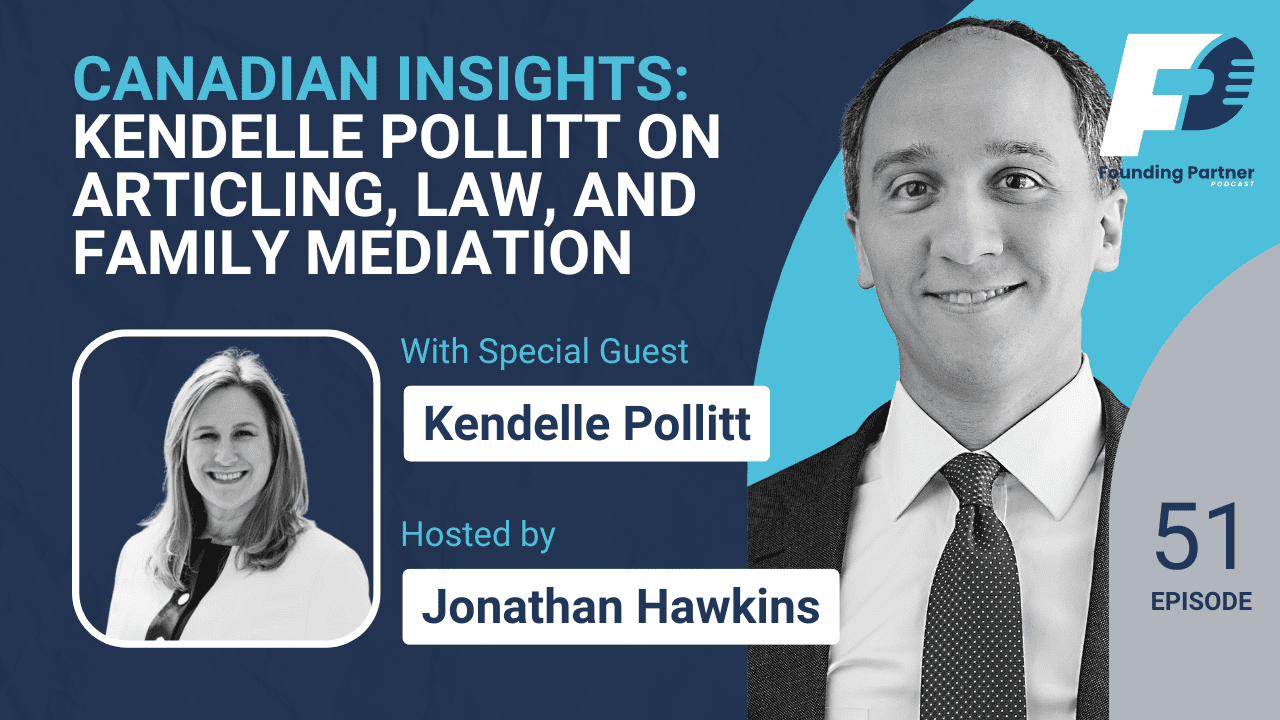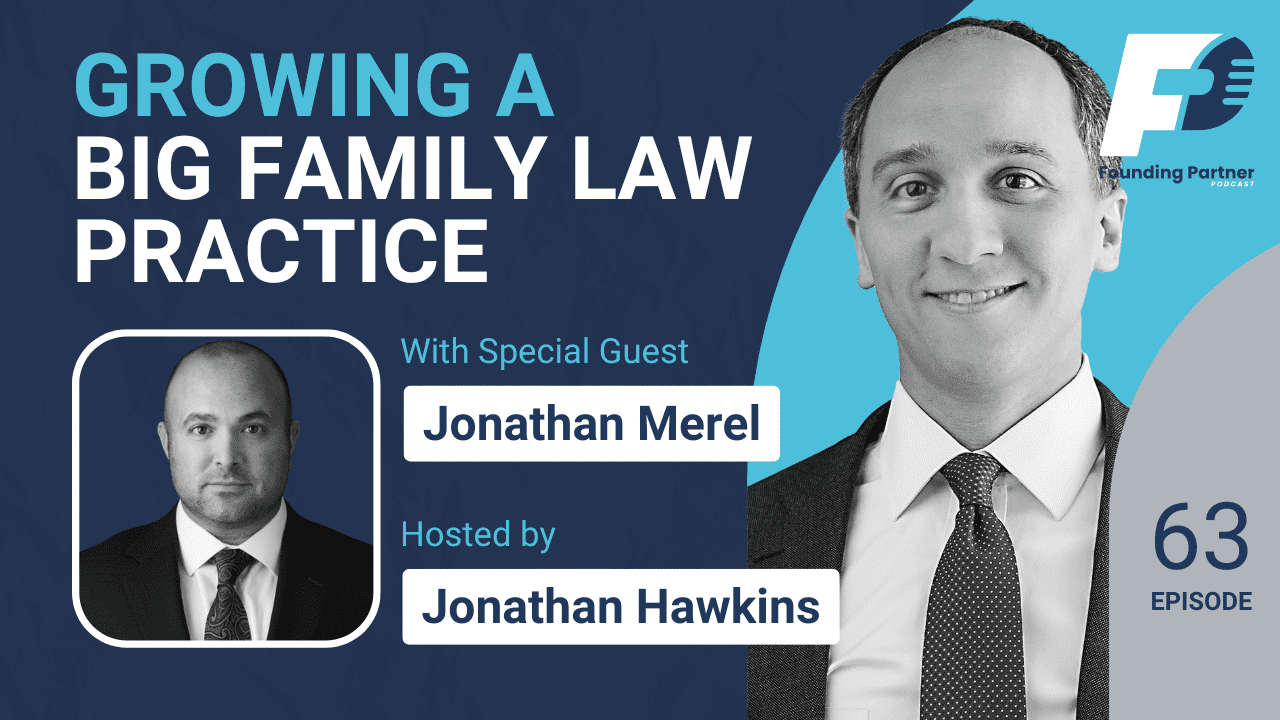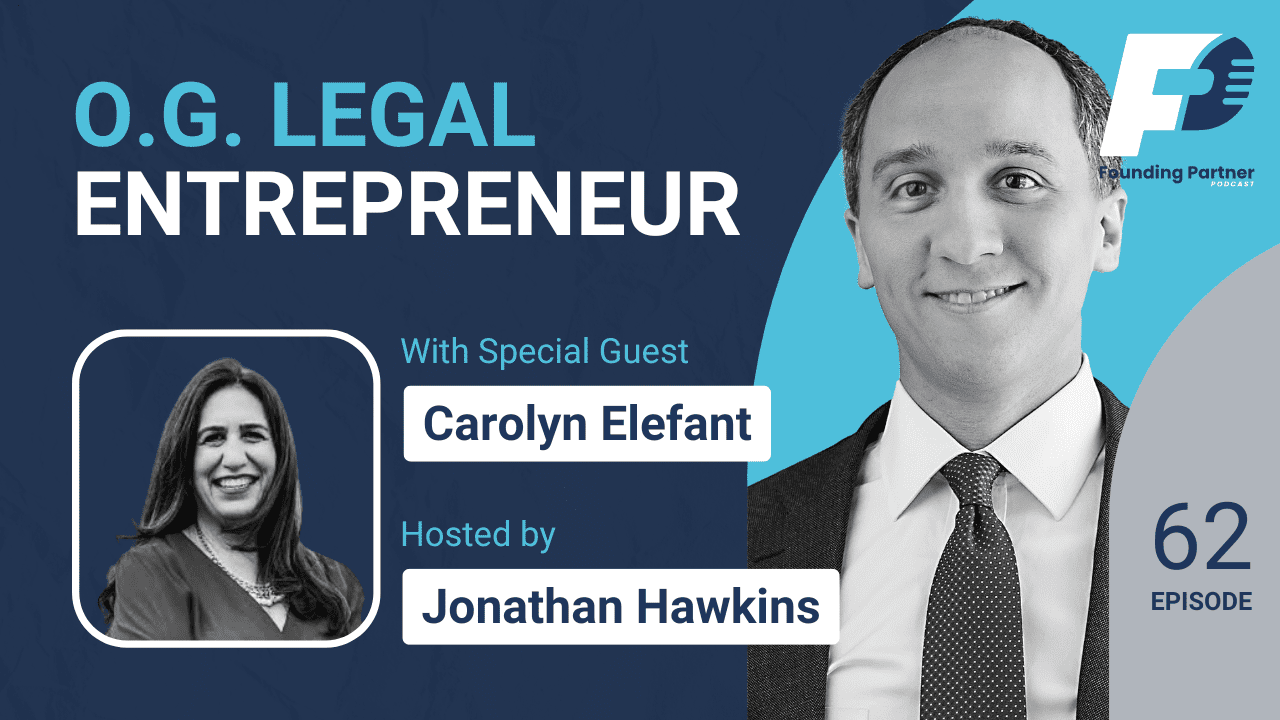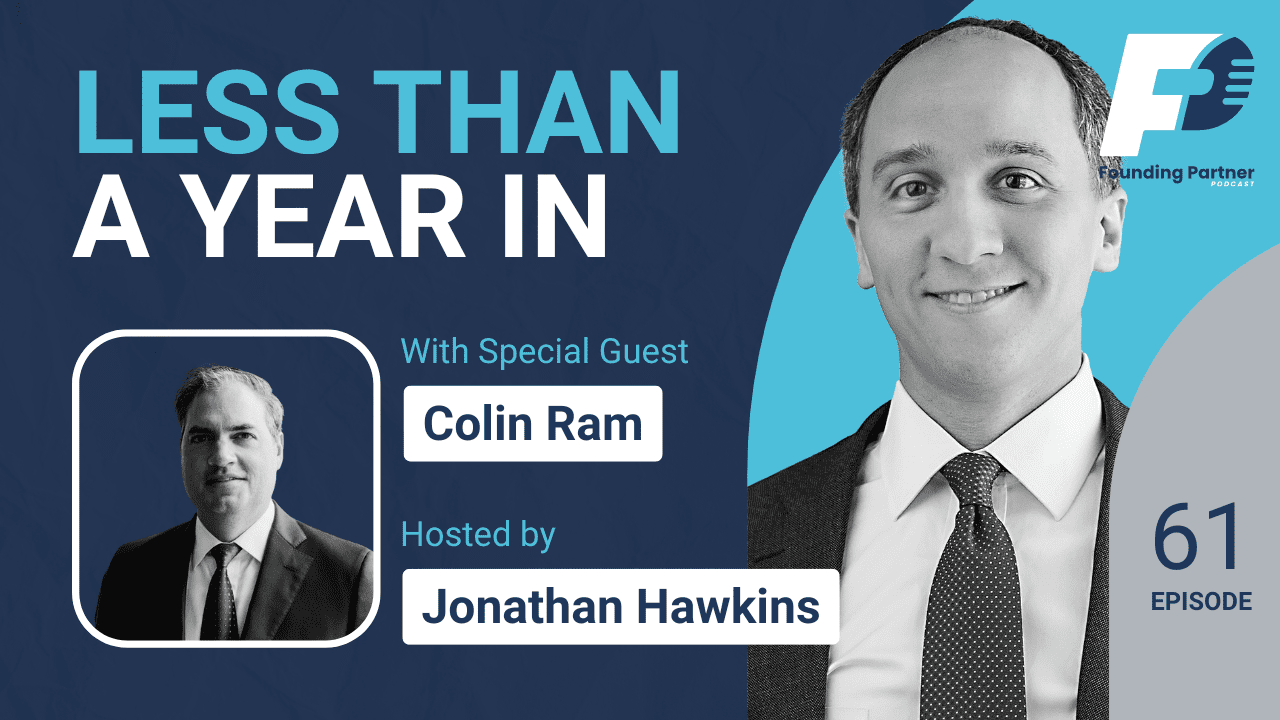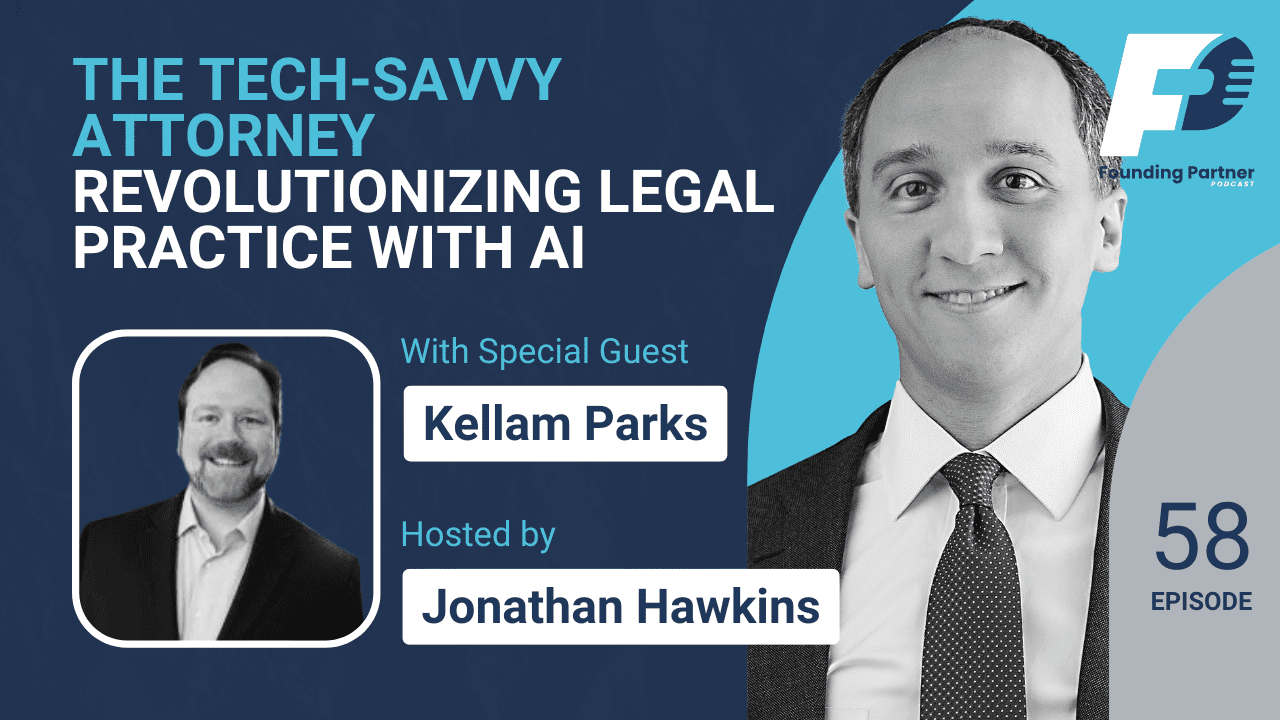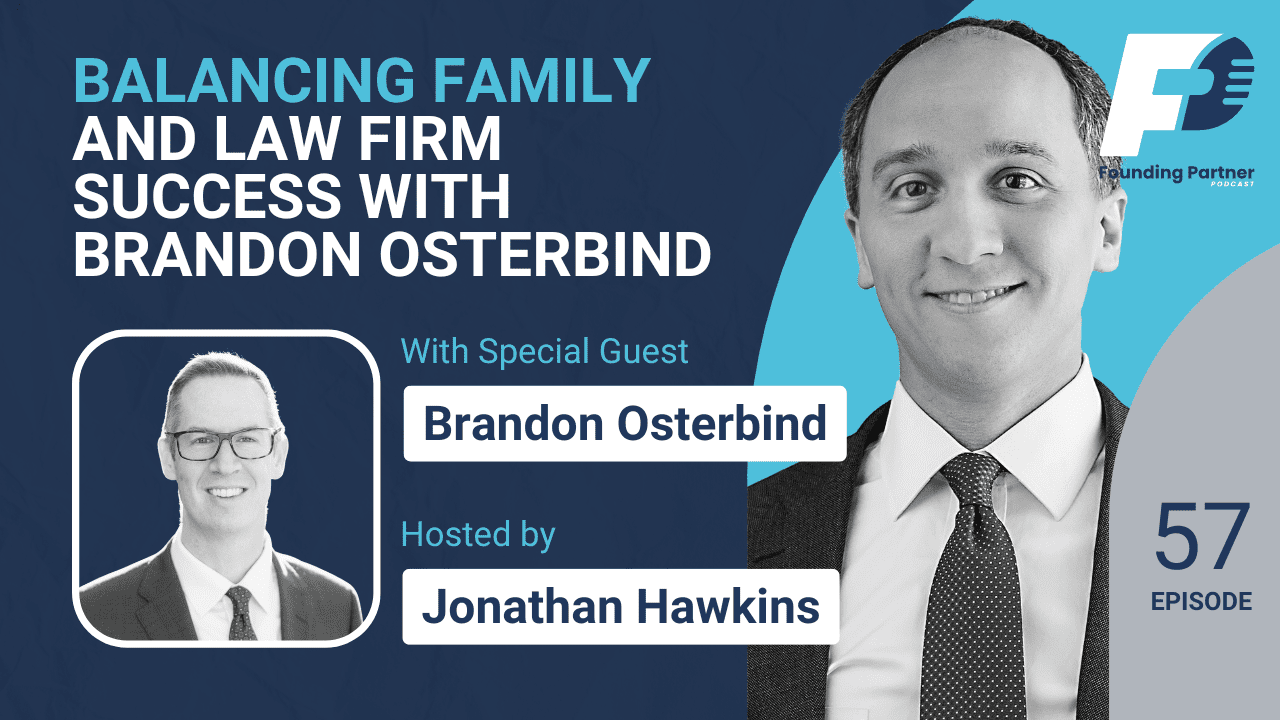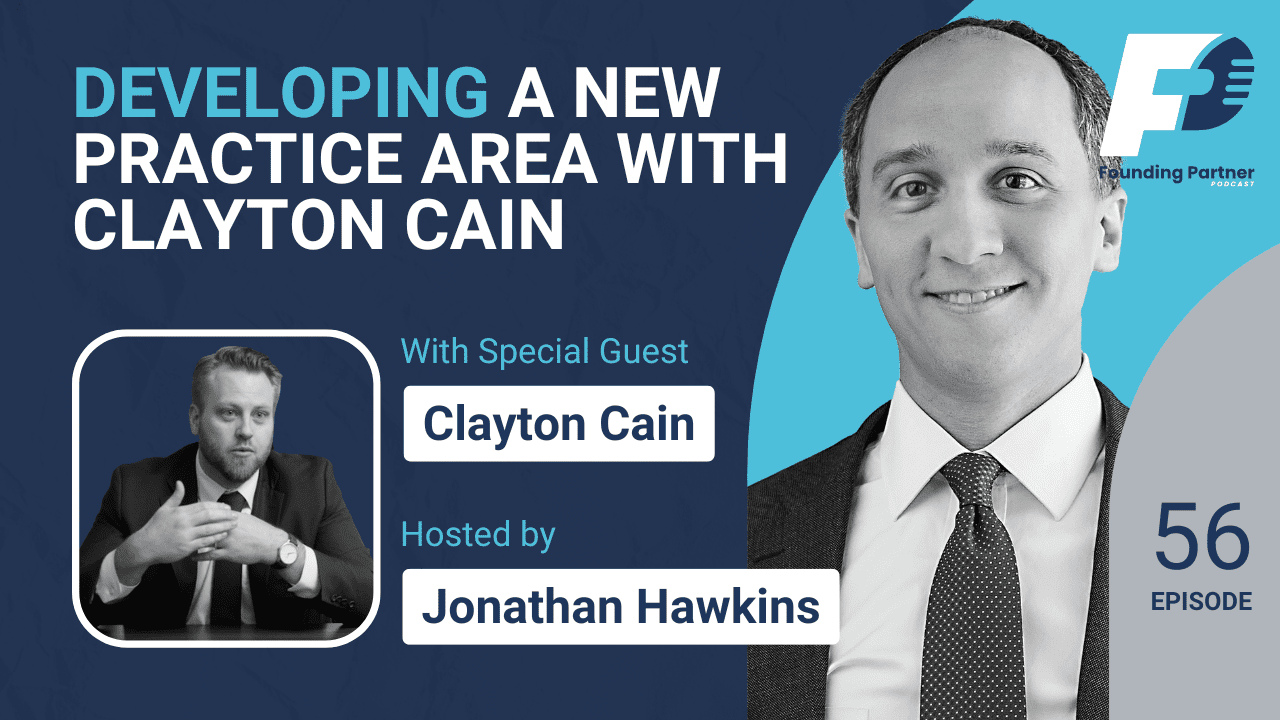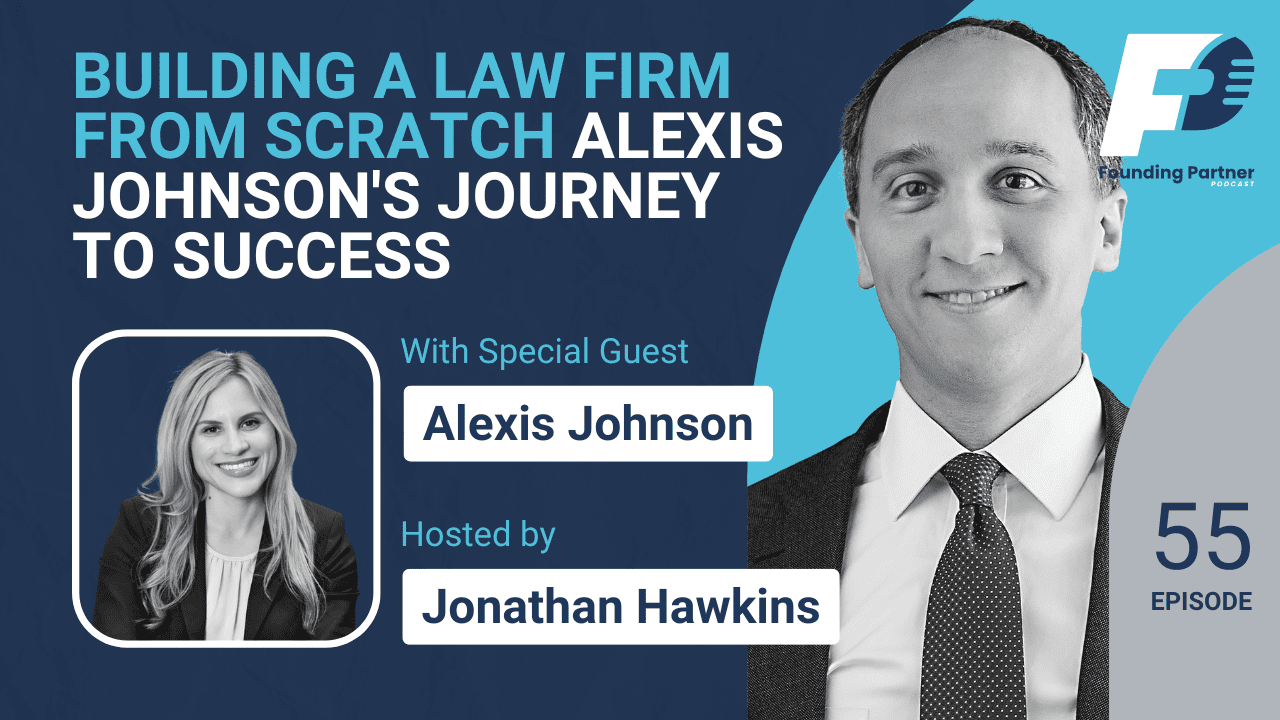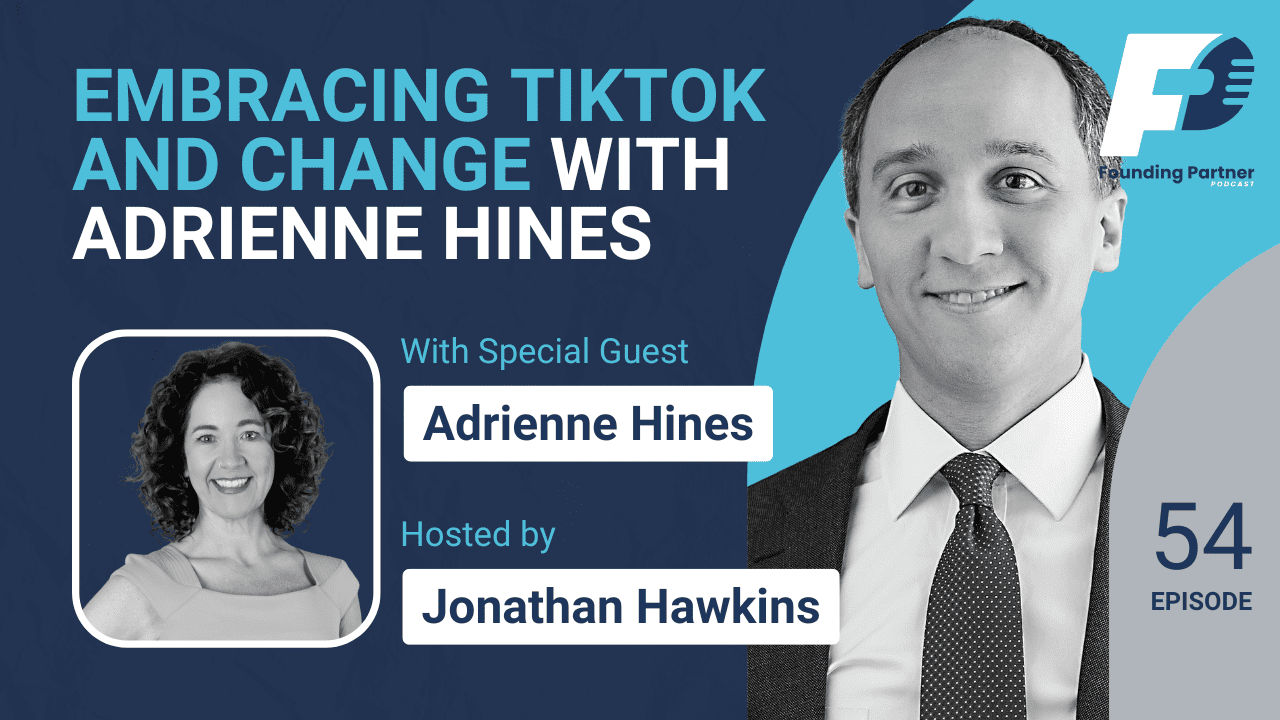Jonathan Hawkins: [00:00:00] Welcome to Founding Partner Podcast. I’m your host, Jonathan Hawkins, and I’m excited.
Jonathan Hawkins: We’ve got a new first for the show. We’ve got our first Canadian Law Firm founder on the show today.
Jonathan Hawkins: So excited to have Kendelle Pollitt on. She is a family lawyer and mediator in, I guess it’s sort of near Vancouver, but Kendelle, why don’t you introduce yourself?
Jonathan Hawkins: So. I guess why law school? Why’d you become a lawyer?
Kendelle Pollitt: Oh gosh. You know, I wish I had some really great inspirational story, but really I don’t. I finished my undergrad degree at the University of British Columbia and I had my Bachelor of Arts in Psychology and so I promptly went and got a job in retail at Daniel Leather. And I worked there for a little while and I thought, well, shit, this sucks.
Kendelle Pollitt: So I wanted to go back to school and I needed a job. So I didn’t really know what I wanted to do. But I had, you know, two really [00:01:00] close friends at the time, my best friend, Allison, and she was going to university to become a teacher and my other best friend Alana, who was going to law school.
Kendelle Pollitt: And so I thought, well, this is going to be how I make my life decisions. I’ll just do what my friends are doing.
Kendelle Pollitt: So, I applied to education programs and I applied to law schools and I got into both. And at the time it was just a little while ago, I won’t tell you exactly how long ago, but believe it or not, it was a time when there was an overabundance of teachers.
Kendelle Pollitt: And so, if you wanted to be a teacher, one of the big complaints at the time was you had to be a teacher on call for a long time before you could actually get a job.
Kendelle Pollitt: And so I thought, well, that doesn’t sound very fun to me, so I might as well go to law school. So really, that’s how I ended up at law school.
Jonathan Hawkins: That’s great, you know some people were born to be there or they’ve known it [00:02:00] since they were like 10 and others were like yeah nothing else to do. So
Kendelle Pollitt: That was me. Yeah.
Jonathan Hawkins: My dad was a lawyer and I did not want to be a lawyer. I was like, I am not going to be a lawyer. I’m not gonna be a lawyer. And here I am, you know.
Jonathan Hawkins: So what’s law school like in Canada? Is it a three-year program or is it, you know, that’s what it is in the States? So,
Kendelle Pollitt: That’s the same. It’s a three-year program. You write your LSAT, you go in, you go into first-year law school and you take, you know, your constitutional law and your criminal law and, you know, civil procedure, all those kinds of basic courses.
Kendelle Pollitt: And then as you advance in through law school, then you start taking, you know, more defined courses, but it’s really not that different.
Kendelle Pollitt: So,
Jonathan Hawkins: So there’s something I see occasionally on LinkedIn, I guess, from some of the Canadian lawyers and it’s something like articling or something.
Jonathan Hawkins: What does that mean? I don’t know what that means.
Kendelle Pollitt: So, it varies by province. But basically what we have is after you finished law school, so in British [00:03:00] Columbia, after you finish law school before you can just go out and call yourself a lawyer, you need to finish what’s called an articling term. And basically, it’s a year-long internship.
Kendelle Pollitt: So you basically work under another lawyer. You have to find a senior lawyer, or I think it’s a five-year call or something like that. You need to find a lawyer who’s been a lawyer for at least five years to be your principal.
Kendelle Pollitt: And so essentially they need to take you under their wing and guide you through to the practical aspects of actually being a lawyer, basically everything you need to know that they don’t teach you in law school.
Kendelle Pollitt: There’s also a 10-week course we call PLTC, which is a professional legal training course. And you have to take this PLTC course and it just basically is more practical training, you know, those kinds of things. And then at the end of the course, you take your bar exams.
Jonathan Hawkins: So during [00:04:00] the articling, so let’s say I graduate law school and I want to go open up my own shop immediately. Can you do that?
Kendelle Pollitt: Yeah. After you finished articling.
Jonathan Hawkins: So, you have to do the internship for a year. So what happens if you can’t get an internship? Or.
Kendelle Pollitt: Well, see, this is a problem, right? So when I went to law school, basically, you know, getting an articling job, it was competitive to get articling jobs at top law firms, big law, those kinds of things.
Kendelle Pollitt: But generally speaking, it wasn’t that hard to get an articling job with somebody. But nowadays it’s competitive. And so we’re really struggling with that as a profession because we’re having a lot of young law students graduate and they’re being put in positions where they’re being, you know, taken advantage of.
Kendelle Pollitt: And in terms of the work underpaid, in some cases not paid at all, which I’ve heard just so they can get their articling under their belt. And check off that box to become lawyers.
Kendelle Pollitt: So it’s something that we’re [00:05:00] really struggling with as a profession and looking at different options and opportunities. And there is some interesting things coming down the pipe, but essentially right now that’s the program.
Kendelle Pollitt: But yeah, no, I think it’s just not working. I think with more and more students getting internationally trained, right?
Kendelle Pollitt: It’s not like in the old days where, you know, you’re Canadian, you go to Canadian law school and then you become a lawyer in Canada.
Kendelle Pollitt: It’s really, people are going everywhere to go to law school and then they’re coming back.
Kendelle Pollitt: So,
Jonathan Hawkins: Because, like, in the U.S., most people go, after law school, they go to a firm or they go to a government job or somewhere but there’s always some group that can’t find a job anywhere.
Jonathan Hawkins: So they’re like, I’ll just open my own firm. But if we had to go through a one-year articling, I mean, they’d sort of just be screwed. I mean, what would they do?
Kendelle Pollitt: Yeah. Well, we don’t have as many lawyers in Canada as you guys do in the States, right? So,
Jonathan Hawkins: That’s true.
Kendelle Pollitt: It’s a smaller group out here. I mean, I think California’s population is bigger than [00:06:00] all of Canada.
Jonathan Hawkins: Wow. Yeah, that makes sense. Well, yeah, California’s got a huge economy, so that makes sense.
Jonathan Hawkins: All right. So, where do we start? Let’s go maybe I think you started your firm about 5 years ago now, right?
Kendelle Pollitt: Yes.
Jonathan Hawkins: You just had your 5th year anniversary.
Kendelle Pollitt: Yeah, we just celebrated our fifth year anniversary and had a big party out on White Rock beach, so it was awesome.
Kendelle Pollitt: So yeah, I opened up a firm in September 2019. So that was interesting, it was just me and my legal assistant. We just kind of stepped out and went and found a business center, rented a couple of offices.
Kendelle Pollitt: I had. You know, maybe about 15, 20 clients, not very many that came with me. And we just started plugging away, no website, no business plan. I really had no kind of idea what I was doing or how I was going to do it.
Kendelle Pollitt: But we went out and I’m very lucky to have my legal assistant Laura have come with me and she’s still with [00:07:00] me today.
Kendelle Pollitt: So that was helpful, but
Jonathan Hawkins: Did you always know you were going to start a firm or is this sort of
Kendelle Pollitt: No.
Jonathan Hawkins: Spur the moment? How did it go down?
Kendelle Pollitt: Well it wasn’t really spur of the moment. I think it was a series of events and changes professionally as time went on.
Kendelle Pollitt: You know when I first started, my goal was to be a partner in a successful kind of, I was thinking I had mine like a midsize law firm, not too big, not too small, just step in, be a partner to me.
Kendelle Pollitt: That was the epitome of you know, success and professional accomplishment, but things change over time, right?
Kendelle Pollitt: I mean, things are a bit different now and I’m not, you know, it hasn’t been that long, but a lot of the firms I was working at were primarily male-based when it came to the amount of lawyers in the firm or the lawyers or partnerships were entirely male.
Kendelle Pollitt: And so. You can [00:08:00] start to be disillusioned as to opportunities, regardless of how successful you are in the firm, you know, in terms of billings and all these kinds of things.
Kendelle Pollitt: And as family life develops and you need to start to juggle more and more as an adult, you get kids, you know, my husband is a banker.
Kendelle Pollitt: And so he has had, I’ve been very lucky because he’s been very supportive of my career and so I would say for the most part of our career or both of our careers, you know, he’s kind of taken a step back and really supported me and being able to do what I need to do as a litigator, right?
Kendelle Pollitt: I mean, people rely on us as litigators. We need to be able to perform and be there if we need to be.
Kendelle Pollitt: So I had a lot of support from him in that way. And then he wanted to do his MBA. And so we basically decided I was going to step back from my practice a little bit. I cut down my hours quite a [00:09:00] bit.
Kendelle Pollitt: I went to an association of lawyers. It was kind of like a bunch of sole practitioners. We worked together, shared expenses, and we did that for a while.
Kendelle Pollitt: I had a young son. Well, two young sons, my youngest was a baby at the time and my oldest was in kindergarten. And so that worked well for us. He was going to school working full time.
Kendelle Pollitt: I had two young kids and it worked well, while it worked well but when my youngest was in kindergarten, I started to feel that itch, you know, the itch about I want to do more, and this isn’t enough.
Kendelle Pollitt: And when I want to do things now, I need to talk to all these people and try to convince them to spend money when it’s not necessarily all of our values aren’t aligned.
Kendelle Pollitt: So off I went and started my own firm and really had no idea what I was going to do or how I was going to do it. And lo and behold if we think back COVID hit
Jonathan Hawkins: I know I was going to ask you about that. So, you start in [00:10:00] September, things are looking good. You’re like, I’m about to conquer the world.
Jonathan Hawkins: Then, when did Canada shut down or did they? I can’t remember.
Kendelle Pollitt: All the same time. It was all around, you know, March of 2020. Right?
Kendelle Pollitt: So I remember yeah, so everything, it kind of slowed down quickly. I remember I was in Palm Springs at a girlfriend’s place. We had a girl’s trip in Palm Springs in early March and things were just starting to happen and you know, we were kind of sanitizing around the airplane and we thought, Oh, there’s people starting to wear masks weird.
Kendelle Pollitt: And then on the plane ride home, there was all these Facebook messages about panic at Costco because all the toilet paper was flying off the shelves.
Kendelle Pollitt: So it’s like, what the heck? So we got home, thank goodness. And it was about a week or two after that, when you know, everything started shutting down.
Kendelle Pollitt: So for me, you know, COVID [00:11:00] was in a lot of ways, I mean, it was a curse and a blessing, right?
Kendelle Pollitt: So for me, COVID was a blessing in a lot of ways. I think by that time, my husband and I were getting very busy. So for any parents out there who are trying to juggle two careers, you know, running kids around to every which way to activities here, there, and everywhere.
Kendelle Pollitt: It was a lot, right? And so you don’t realize you get into this craziness until all of a sudden it stops.
Kendelle Pollitt: And so for me, COVID was a blessing because everything stopped. I was like, Oh, wow. You know, this is what it feels like to not be so stressed and harried and running to, you know, hockey Reynos all over Timbuktu.
Kendelle Pollitt: And actually enjoying my family and enjoying my husband again. Okay. Wow. We’ve got things in common other than just, you know, the [00:12:00] kids and running the house, so that was fun.
Kendelle Pollitt: But for me also, it was, my practice shut down because I had no website, right? My practice at that point was solely word-of-mouth referral-based.
Kendelle Pollitt: And it wasn’t a lot because I hadn’t really spent much time developing myself in that way. So my workload and the courts shut down just like you guys.
Kendelle Pollitt: So all of a sudden my court calendar was wide open. People weren’t wanting to hand over, you know, the $5,000 retainers on their credit cards as easily or at all.
Kendelle Pollitt: And I had no way of really letting people know that I existed because I had no digital presence at all.
Kendelle Pollitt: And so from there it was interesting because I then started thinking, okay, I need to figure out what to do here. I need to figure out what I need to do in order to get [00:13:00] business through this door.
Kendelle Pollitt: And so I just started learning and researching and reading and doing. So, created a website. I different online seminars to figure out how to run a business, started creating things like procedure manuals and processes and protocols on how to you know, basically, I’m now thinking, okay, I’m going to get this great business and I’m going to have people come through the door.
Kendelle Pollitt: But what happens when it’s not just me doing the work and my legal assistant who’s been with me for eight years and the two of us basically, you know, communicate through telepathy when it comes to job because we’ve been working together so long.
Kendelle Pollitt: So taking everything out of both of our brains and putting it onto paper and figuring out how I could make this practice more efficient.
Kendelle Pollitt: And so I just worked and worked and spent time [00:14:00] just doing that. Now it helped that my husband, I had a condo in Whistler and we still do. So we spent our time, you know, we were up in Whistler. And just spent our time there with the kids hanging out and just, you know, working on interesting things.
Kendelle Pollitt: And my husband was in banking too, as I said. And so he was a director of small business at a credit union. And so he was so busy too, but doling out all of the different loans.
Jonathan Hawkins: Yeah. Did Canada hand out money like the U S
Kendelle Pollitt: Yeah, it was like water just like, you know, throwing out money. Right?
Kendelle Pollitt: And so, my husband was just so busy working, developing these programs, and implementing them to make sure everyone got money quickly.
Kendelle Pollitt: So, it was really interesting time. I just spent a lot of time working and learning and not working on the practice.
Kendelle Pollitt: It was literally, hours and hours and days upon days and weeks upon weeks [00:15:00] of just learning how to develop a business and market a business.
Jonathan Hawkins: You know, those COVID days you know, there are parts of it that were in the beginning, everybody thought everybody was going to die, so it was a little scary, but then sort of settled in.
Jonathan Hawkins: It was like, it was really nice. Like I lived at the time lived on a very busy street where cars cut through the street, then there were no cars.
Jonathan Hawkins: My kids could ride their bikes out in the street. It was cool. And the other thing that, you know, you’re a family lawyer. Some of the other family lawyers that I know, you know, everybody having to stay at home cooped up together. It’s sort of led to almost a boom in divorces afterward. Did you experience that?
Kendelle Pollitt: Yes, definitely. So that helped because when things started opening up a bit and we were able to get back into the office and start working.
Kendelle Pollitt: I mean, we were an essential service too, so we could, as law firms, we could continue to operate if we wanted to and chose to.
Kendelle Pollitt: So as things started to open up and I started to learn how to market myself digitally without actually [00:16:00] going to you know, networking events and speaking to people, then clients started to come through and it was a tough time for people because not only were there a lot of couples out there that, you know, the time together did not do well for their relationship.
Kendelle Pollitt: And so time to call a family lawyer, but also the backlog for so long.
Kendelle Pollitt: So there was just a ton of work, and it was really helpful for my business. So I was lucky in that regard, because the timing was actually a blessing in so many ways, as I said, because by the time things opened up again, I had that time to learn my marketing, put together some procedures and systems, learn some more about leadership and how to manage people, how to manage staff.
Kendelle Pollitt: And also that coincided with the opening of the world by [00:17:00] and the influx of potential clients needing family law lawyers.
Kendelle Pollitt: So the challenge actually at that point was keeping up with the work.
Jonathan Hawkins: Well, yeah, we’ll talk about that. You know, getting the people in to help you actually do the work which, so you had this, you know, you started your firm and then COVID hit, you had the time to sort of develop all the systems and the marketing and all that. And then it opened up and then boom, you’re ready to go.
Jonathan Hawkins: So we mentioned many ago, you just celebrated 5 years. I think I saw some posts that your firm was recognized like number 88 on the top 416 top growing companies in Canada.
Jonathan Hawkins: So congrats on that the growth. So tell me about the growth. So it was you and your assistant when you started and then, you know, where are you now?
Kendelle Pollitt: So, you know, as most can probably imagine that growth is not always linear, right?
Kendelle Pollitt: It feels like whenever you’re an entrepreneur, you know, it’s two steps forward, one step back, five steps [00:18:00] forward, four steps back, but then you get 10 steps forward. And so it’s always this tug of war in trying to continue to move forward, continue to build on what you have developed, and make everything better and do better and be better.
Kendelle Pollitt: So that’s really, you know, the trajectory, it was certainly not always an easy road forward and an easy road of growth at one point.
Kendelle Pollitt: Because during that time, one thing I haven’t mentioned too, is during that time, my legal assistant, Laura right away, like during COVID when COVID hit, she got pregnant and in Canada, we have long maternity leaves.
Kendelle Pollitt: So you’re entitled to take up to a year, maternity leave when you have a baby and so Laura got pregnant twice within like the first three years or so, like she came back to work and then she was like, Oh, by the way, I’m pregnant [00:19:00] again, sorry.
Kendelle Pollitt: So it was hard because I’d had her as my sidekick for so long, and then trying to do this without that kind of steady presence.
Kendelle Pollitt: And so, you know, we were hiring when she went on mat leave, and so we went from like the two of us, to then three, and then those two people didn’t work, and then all of a sudden it was just me, and I was like, oh my goodness, right?
Kendelle Pollitt: So, down to one but you know, it’s funny things work out. You just kind of stay positive and you just keep pushing forward and you just keep putting one foot in front of another and you work through the difficulties.
Jonathan Hawkins: You know, I’ll tell you, I’ve been there and I know others that have been there.
Jonathan Hawkins: So you grow, you get the people and you think it’s humming along, and all sudden, those people are gone and then it’s all back on you and maybe you and one other person and you’re just like holy crap how can I handle all this? And that’s hard.
Jonathan Hawkins: So you mentioned a minute ago, nowadays, there’s more lawyers maybe than positions.
Jonathan Hawkins: What about sort of non-lawyers [00:20:00] staff? Are they hard to come by nowadays or?
Kendelle Pollitt: Oh yeah. You know, one of the things I’ve found really beneficial as an entrepreneur and a law firm owner, really small law firm owner is connecting with others that are going through similar experiences.
Kendelle Pollitt: And so, for me, that was joining a mastermind group of other small law firm owners, and it actually wasn’t anywhere near me.
Kendelle Pollitt: You know, I’m traveling all the way to Washington, DC to communicate and meet with this group every quarter. But it’s been fantastic because you realize that even though we have different practice areas, you know, I’m the only Canadian in the group. Not only that, there’s really, it’s mostly, you know, people on the East Coast as opposed to the West Coast.
Kendelle Pollitt: So, there’s so many differences, but at the end of the day, we’re all entrepreneurs, we’re all lawyers, and we’re all [00:21:00] trying to go through you know, achieve generally in some way, the same thing, which is a successful, profitable business where we can operate as lawyers with integrity and you know, professional satisfaction.
Kendelle Pollitt: So having said that I mean, really, it doesn’t matter where you are. It’s staffing, it’s the one thing we talk about and complain about all the time, whether we’re looking for lawyers, whether we’re looking for legal assistants, paralegals, marketing assistants, like everyone is just such a challenge, no matter what.
Kendelle Pollitt: I remember one time we were joking and one of my friends there, she said they had this interview and she thought, you know, should I offer to have them picked up in a limo so that they actually show up for the interview, you know, so it’s a challenge.
Kendelle Pollitt: And not only that, when you do find someone to hire, okay, is this the right person? Right? Did I actually make the right decision here?
Kendelle Pollitt: And sometimes it’s the right [00:22:00] decision and sometimes it’s not. And that’s a challenge, no matter where you are, what area of law you practice.
Jonathan Hawkins: Yeah I’m with you and I’ll tell you when you get a superstar, no matter what type of position they’re in when you get one. It’s just night and day. It’s just like, Holy crap. This is what it’s supposed to be. It’s an amazing experience.
Jonathan Hawkins: Uh, least for me.
Kendelle Pollitt: It feels so easy, right? And then, you know, I think as lawyers were generally type a personalities. And if we’re running law firms, it’s very easy for us to get down on ourselves too, because, okay, is every problem a leadership problem? Right?
Kendelle Pollitt: But I don’t necessarily subscribe to that. I take responsibility. I take a lot of responsibility on probably too much still on everything that happens in my practice and in my firm.
Kendelle Pollitt: But at the same time as lawyers, and as law firm owners, we have to say, okay, we can’t do it all. We can’t always make the right decision.
Kendelle Pollitt: And you [00:23:00] know, sometimes it’s a people problem and it’s not a leadership problem and it’s about getting the right person in the right seat. And that’s a real challenge.
Kendelle Pollitt: So one of the things I’ve really learned and have subscribed to as of late is trying to make those decisions. If I make a wrong hiring decision, I pull the plug much faster.
Kendelle Pollitt: You know, I used to just let it drag on and try coaching and talking and reviews and all these things to try and help people through it and give them chance after chance.
Kendelle Pollitt: And I’ve really stepped back from that approach. And I’ve really, you know, taken the position at this point, you know, what is it, I think the saying is higher, slow, and fire fast.
Kendelle Pollitt: And I try to do that as much as it sounds terrible, but it does help.
Jonathan Hawkins: I mean, it sounds terrible, but it’s so true. And I think that’s the sort of thing where you do it long enough and you hire enough people and you see enough that it’s so [00:24:00] obvious, like once you’ve been through it enough.
Jonathan Hawkins: You know, I tell the story a lot, but I’ve got a friend who’s, She’s a family lawyer here in Atlanta.
Jonathan Hawkins: And at one point she said, yeah, I hire two people for every position because I know one of them is not going to work out.
Kendelle Pollitt: It was exactly, you know, I knew within a few weeks, really, it’s just, this person wasn’t gelling and you know, not fitting with the culture, not fitting with what I was looking for as a team member. You know, bright, young lawyer, but yeah.
Jonathan Hawkins: Well the other thing too, I mean, you think about it, it’s not fair to either side. So usually they know they’re not fitting in and you know, they need to be in a place that’s better suited for them.
Jonathan Hawkins: And you know, and if they can’t find it, then they sort of create their own. But I think, it’s like that almost anything, you know, like school, team, fraternity, sorority, whatever it is, you know, you call it, it’s like, you know, you’re not supposed to be in every group because not every group’s for you. Right?
Kendelle Pollitt: Well, and that’s it, that’s exactly right. Yeah, that’s exactly right. So.
Jonathan Hawkins: So how many attorneys do you have now?[00:25:00]
Kendelle Pollitt: So right now, there’s seven attorneys and eight support staff. So we’re at 15 plus a few like I’ve got an external bookkeeper that comes in still once a month to help. We’ve got our external tech guy who we have on speed dial for everything.
Kendelle Pollitt: But, you know, I’m always still continuing to try and grow and expand at this stage. I still am in desperate need of another legal assistant. I’m in desperate need of another paralegal and I could use at least another lawyer, right? At least one other lawyer at this stage.
Kendelle Pollitt: So, we are currently under capacity in terms of our staffing right now, but you know, we just keep one thing that’s kind of interesting.
Kendelle Pollitt: So we just I mean the works of opening up an office in Vancouver. And so it’ll be interesting to see how [00:26:00] that shifts because my practice right now is suburban-based. Right?
Kendelle Pollitt: And so usually when you, I’m more limited in terms of recruitment to people who live in the immediate area, generally speaking.
Kendelle Pollitt: But when I moved downtown, Vancouver opened up an office down there, hopefully within the next six months or so, it’s all in the works. Knock on wood.
Kendelle Pollitt: You know, I’ve learned as an entrepreneur that the best-laid plans don’t always pan out. But I’m hoping that may help in terms of the central location of the office may be able to help with recruitment, but who the heck knows, right?
Kendelle Pollitt: So it’s going to be a new market, a new adventure, and I’m looking forward to that, but you know, ask me in a year.
Jonathan Hawkins: So how are you going to do that? So are you going to be going into the office every day or how are you going to sort of manage that office?
Kendelle Pollitt: Yeah, well, I’m going to have to just divide my time. So I’ll continue to spend a couple of [00:27:00] days in the White Rock office. I try and spend at least one day a week in the Twason office, and then I’ll go and spend a couple of days in the Vancouver office.
Kendelle Pollitt: I mean, my goal for my firm is to not, you know, I’d like to have partners. I love to grow this firm so that it is much bigger, but I don’t need to hang on to all the power.
Kendelle Pollitt: I don’t need to hang on to all of the success for me. I’m looking to share it. I’m looking to have others come along with me on this journey and, you know, share the load, but share the success and the benefits as well.
Kendelle Pollitt: So, you know, my hope would be that eventually I can have one partner at each location and see how that goes.
Jonathan Hawkins: Yeah, you know, it’s fascinating to me opening other offices, you know, I’ve talked to a lot of attorneys that have done it and, you know, I guess you’ve done it twice.
Jonathan Hawkins: Now you’re going to a bigger market. That’ll be a new challenge, a new learning experience. And then I [00:28:00] guess you’ll learn from that.
Jonathan Hawkins: Maybe you can open another one after that. You know.
Kendelle Pollitt: Yeah.
Jonathan Hawkins: What do you have? Provinces or states, what are they called in Canada? It’s a instead of states,
Kendelle Pollitt: So, provinces. Sorry.
Jonathan Hawkins: So, I mean, again, I don’t know enough about Canada, but obviously Vancouver is very dense, a lot of people there. And then the East Coast is very dense too.
Jonathan Hawkins: I don’t know if there’s much in between. Is it easy for you to sort of geographically expand out of your province or is there much?
Kendelle Pollitt: No, it’s the same as in the States, right? So we have for each province, generally our civil law, you know, family in your civil laws governed by the province primarily, right?
Kendelle Pollitt: So I’m licensed to practice in British Columbia. If I want to practice in Toronto, for example, then I need to go and get licensed in Ontario.
Kendelle Pollitt: Now, is it really difficult? I need to learn the law and I need to take the bar exams out there in order and pass and get licensed. But that’s, you [00:29:00] know, basically the barrier.
Kendelle Pollitt: So you could, yeah, there’s several provinces. There’s different hubs between Vancouver and Toronto in Canada. But I’d say those are the two large hubs in our country.
Jonathan Hawkins: Well, maybe one day, maybe we’ll see. You’ve got seven attorneys now. That’s pretty good growth for five years, especially with COVID there in the middle You know, so really it’s probably more like three years, right?
Kendelle Pollitt: It really is. Yeah, it really is.
Jonathan Hawkins: And so your firm also, you do family law based, but you also do some mediation. What’s the breakdown there between the two practice areas? And is it just you that mediates or there are other people in the firm that
Kendelle Pollitt: Yeah. So right now, it’s just me that mediates currently seeking a mediator. I’d love to have a mediator come in and work because I don’t have the time to do the mediations where unrepresented parties come in and want to work it out on their own.
Kendelle Pollitt: Right now, I’m limiting my mediation practice to just mediating where other parties [00:30:00] where they’ve got their own lawyers and the parties and the lawyers are seeking a mediator to come in and help everybody come to some kind of resolution.
Kendelle Pollitt: So that’s what I’m limiting my mediation practice to right now. I have a handful clients that I deal with in my family law litigation practice, so I’d say my mediation practice is probably maybe only 10 or 20% of my overall legal practice.
Jonathan Hawkins: What’s your vision there? You know, a lot of lawyers want to shift, you know, they’re like, all right, I’m tired of litigating. I want to basically do all mediations.
Jonathan Hawkins: And then I know other mediators that say, I want to keep litigating because it makes my mediation practice better. I don’t know, what’s your thoughts on that?
Kendelle Pollitt: Well, I think both are good views, right? I think they both have merit, both views. For me, I like continuing my litigation practice because I think it keeps me sharp.
Kendelle Pollitt: It keeps my legal skills up and [00:31:00] really helps me maintain a good knowledge of the law and how to help people.
Kendelle Pollitt: But I think at the end of the day, things have changed in family law as compared to, and I don’t know if it’s like this, you know, everywhere, but I can imagine that it is, but generally speaking, gone are the days where people want to go and get their shark lawyer and, you know, litigate to the death when they separate.
Kendelle Pollitt: Families just don’t want it anymore. They want to resolve their matter as quickly, as amicably, and as efficiently as possible.
Kendelle Pollitt: So whether you’re doing that through your litigation practice or whether you’re doing that solely in a mediation, I think that it’s really important for any practitioner to have a full toolbox of skills that they can use to help a [00:32:00] client get through to resolution.
Kendelle Pollitt: So my practice, I’m a litigator but I practice collaboratively, right? I use every tool available. If I think an interim application on spousal support or child support will help move a file along to an amicable and reasonable settlement so that these parties can essentially get me out of their lives faster and more efficiently then I will use that tool in my toolbox.
Kendelle Pollitt: But at the same time, it’s important to not unnecessarily exacerbate these issues between the parties and also make sure you use all of your negotiations, you know, tactics and skills, right?
Kendelle Pollitt: Like I’ve spent hundreds and hundreds of hours in training recently, I’d say over the last five years, really honing how to negotiate, how to [00:33:00] mediate, how do I use active listening to bring people to resolution?
Kendelle Pollitt: And I use those skills, whether I’m acting as a mediator or I’m acting as counsel for somebody in a family law, a typical family law matter.
Jonathan Hawkins: Yeah, I could see mediation training definitely helping on the litigation side just getting to resolution just having that training.
Kendelle Pollitt: Exactly.
Jonathan Hawkins: So, I want to go back a little bit. So You mentioned when you started, you had no website, no marketing. You had a few clients and then during COVID, you learned it.
Jonathan Hawkins: So, what sorts of things I guess, do you do now and how have you sort of layered those in terms of getting clients and just getting the word out about you and your firm?
Kendelle Pollitt: Well, I think really a multifaceted approach. I don’t think you can rely on just digital or you can’t rely just on face-to-face marketing.
Kendelle Pollitt: And I think the biggest key is just being consistent, just doing it. The biggest thing [00:34:00] is just doing it. Just going and doing.
Kendelle Pollitt: So for me, what I’ve done is, you know, obviously the website helps because if you don’t have a website, you don’t have credibility. You don’t exist as a person or an entity as a firm or anything without a website. So that was my first step.
Kendelle Pollitt: Also, you know, for me, PPC ads, you know, Google pay-per-click ads have been really helpful to get work through the door quickly. So, it’s a tool, it’s not my main marketing tool, but it is a tool that we use.
Kendelle Pollitt: I think in family law, generally all through North America, our PPC costs are not the PPC costs of, you know, a personal injury lawyer. So it’s a more cost-effective way for us to draw people to our website and it works.
Kendelle Pollitt: And then other than that, the big thing for me is getting out there. I’m getting out there in terms [00:35:00] of social media.
Kendelle Pollitt: So I’m posting on LinkedIn. I’m trying to share my successes with the world because when you have your own law firm, it’s not enough to just be a good lawyer, but you need to let others know that you are a good lawyer.
Kendelle Pollitt: And it can be a hard thing to do and a hard mental block to get through for people. But it’s something you’ve just got to do. So you go to social media and you talk about things. Don’t be afraid to chime in on a contentious issue. You know, for digitally that’s been important for me.
Kendelle Pollitt: And then going out there and getting into the community. So because my firm is a suburban-based firm, getting out into the community, showing my face, meeting people, trying to locate those COIs, who are the centers of influence in the community, and try to create relationships with these people.
Kendelle Pollitt: And you meet them through, you know, chamber [00:36:00] events, board of trade events, going to galas, sponsoring community events, just getting out there and every event I go to, I try to tell myself.
Kendelle Pollitt: Okay, Kendall, go and meet, try and meet two to three new people for this event. I don’t need to meet everybody. I don’t need to, you know, conquer the world in that one event. I need to make connections with two or three people.
Kendelle Pollitt: And if I can take those connections away and follow up with them at some time in the future, invite them for lunch., reach out, say, Hey, it was nice meeting you.
Kendelle Pollitt: Some kind of follow-up so that you can build that connection. That is really key and follow-up is the biggest thing. Right?
Kendelle Pollitt: So that comes down again to your intake system and your systems. So if people come in and they’ll have, say, a consult and maybe they’re not ready to retain right in that minute, [00:37:00] what is our follow-up system?
Kendelle Pollitt: So, I mean, we’re getting more into sales as.
Jonathan Hawkins: Let me ask real quick.
Kendelle Pollitt: Yeah.
Jonathan Hawkins: So I’m sort of in the market for a new CRM. So, do you have a CRM system you use? Do you have one you recommend? No.
Kendelle Pollitt: Well, yeah, we use Clio Manage for practice management, and then we use Clio Grow for our intake and a CRM system.
Kendelle Pollitt: You know, it’s okay. I think we’re always looking to build on these programs. One of the great things about Clio actually is that this company is just always growing and developing and adding on new applications and things.
Kendelle Pollitt: So that’s what we use.
Jonathan Hawkins: Yeah. I’m tempted to go outside of the law technology space for what I’m gonna get, but I don’t know, we’ll figure it out. I’ll let everybody know if I get one that I like.
Jonathan Hawkins: So back to marketing. So, you mentioned there’s lots of things that work, you know, there’s so many things you can do and I don’t know Tom, but then there’s also things that may work for [00:38:00] some, but just don’t work for you for whatever reason.
Jonathan Hawkins: I know wasted some time and money on things here and there. So are there any that you’ve tried and just said, yeah, that’s not going to work for you or you’ve sort of figured yours out?
Kendelle Pollitt: No, I think, yeah, there’s a lot of things, right? My view is that if you’re getting out there and you’re putting yourself out there, you’ve got to look, definitely, you have to look at your ROI on all of the things that you do, but for example, one of our marketing events that we do is we go out to monthly, we go to our local community library and we put on a free information session.
Kendelle Pollitt: For I don’t know that we get a ton of work out of those library sessions, but at the same time, it’s getting us out there, we’re contributing to our community. We’re giving back. And I’m a firm believer that, what you give, you receive.
Kendelle Pollitt: [00:39:00] And so from my perspective, has there been things I’ve wasted money on in marketing for sure? You know, and dollars, like the dollars I’ve spent on. You know, banners that didn’t work or were a waste and, you know, crappy marketing materials.
Kendelle Pollitt: I mean, the list goes on and on. I try not to focus on it and I just try to think that anytime I’m putting myself out there, I’m putting the firm’s name out there and we’re trying to do some good in some way that there is value.
Jonathan Hawkins: You know, my view of it, a 100%, my view on that is you got to try things, just don’t bet the farm on any one thing cause if it doesn’t work, you’re screwed.
Jonathan Hawkins: You know, don’t go get a bunch of billboards for three months cause that’s not going to work.
Kendelle Pollitt: No, I agree. I think it’s the same as what is investing. You know what I mean? Do you really want to put everything in one bucket? No, I [00:40:00] like to spread the eggs. I don’t need all my eggs in one basket when it comes to marketing.
Jonathan Hawkins: That’s right.
Jonathan Hawkins: All right. So, you’ve been at it for, you know, five years. It gave you some freedom and control that maybe you didn’t have control over your destiny, that is to start your firm.
Jonathan Hawkins: You’ve grown really good growth. You’re about to open your third office. And congrats on that. But as you’re sitting here today and you’re looking 10, 15 years from now. What’s the longer-term vision from here on out?
Kendelle Pollitt: Well, for the firm, my vision is to have a national family law firm and not only a law firm but also a really dynamic mediation center.
Kendelle Pollitt: So really what I would like to do, and I haven’t really had the time to do is really develop that mediation side of the business.
Kendelle Pollitt: Because I do think that there is just so much potential and there’s really lacking, I think, a [00:41:00] lot of mediation-centered firms where there’s multiple mediators, protocols, and systems in place to really allow people seeking mediation to get that branded form of a service.
Kendelle Pollitt: And by branded, I mean, a consistent process that’s been established, that’s been tried and true, and through testing can give you a good chance at resolution.
Kendelle Pollitt: And it doesn’t matter if you get, you know, John, Jane or Joe to do the mediation for you, everyone is going to kind of follow the same system and the same process.
Kendelle Pollitt: And you’re going to be able to have a really good chance at resolving your matter and taking that vision and spreading it across the country,
Jonathan Hawkins: Coast to coast is that the.
Kendelle Pollitt: Coast to coast,
Jonathan Hawkins: That will be cool. You know, I wonder if the mediation practice grows, you may have to sort of separate the law and the [00:42:00] mediation have two different companies. I don’t know.
Kendelle Pollitt: Potentially.
Jonathan Hawkins: A little state. Stay tuned. Right?
Kendelle Pollitt: Yes.
Jonathan Hawkins: Looking back at your, you know, five years ago self is there any advice you’d give yourself on, you know, maybe speeding up the process or certain mistakes that maybe you could tell yourself to avoid along the way in building your firm?
Kendelle Pollitt: Yes. There’s been lots of mistakes, lots of learning while doing. When I think about mistakes and things I would do differently back in 2019, when I opened up my firm and Laura and I started in a business center. Bought 2000 square feet of office space that was in pre construction phase.
Kendelle Pollitt: And when I bought this office space, I truly had no idea how I was going to pay for it at the end of the day, how I was going to fill it, you know, what I was going to do with [00:43:00] it.
Kendelle Pollitt: I really had no idea, but I figured I had until It was supposed to be done Q4, 2021. And I bought it in, I think, January 2020, again, just before COVID.
Kendelle Pollitt: And so, you know, I bought this place and I kept going and thinking, okay, well, let’s see what I can do. I thought maybe I can rent out some space or I’ll just build out a quarter of it.
Kendelle Pollitt: And of course, you know, delays and delays with construction. And by the time I moved into this space.
Kendelle Pollitt: It was delayed by we moved in, in September 2023.
Kendelle Pollitt: So, that was a challenge because I think if I were to speak to my future self, number one, I think it was a great idea because at the time, you know, I didn’t know how I was going to get to this space.
Kendelle Pollitt: But [00:44:00] it also drove me to grow and gave me a destination because I knew that I needed to fill this space. I needed to be able to pay for this space.
Kendelle Pollitt: And so it gave me, you know, a goal to achieve. The problem was that by the time we moved into this new space, we were grown out of it.
Jonathan Hawkins: Yeah, I was going to ask.
Kendelle Pollitt: It was too long, right?
Kendelle Pollitt: Yeah. So, you know, would I change things? Yes. I think I would probably have bought a bigger space if I could now.
Kendelle Pollitt: I would have changed things in terms of getting trades and things like that so that things could have been done more efficiently. I don’t think things were done as efficiently as they could have been done.
Kendelle Pollitt: You know, so I don’t know. I mean, there’s a ton of things, but I think at the same time, looking back, I did the best I could and it’s generally been successful.
Kendelle Pollitt: And a lot of times it’s kind of like [00:45:00] childbirth, right? And I know I’m talking to a man here, but you know, it really is painful, but by the time it’s done, you really forget and you just kind of move forward and look at the good.
Kendelle Pollitt: So that’s where I’m at basically with my business.
Jonathan Hawkins: Well, that’s cool.
Kendelle Pollitt: Try and put it on the good and the future.
Jonathan Hawkins: So another question I didn’t ask. So your firm’s name, how did come up with that?
Kendelle Pollitt: So, Pier Lawn Mediation. So, yes, living and working in White Rock. In White Rock, as I said, it’s a coastal town right on the Pacific Ocean. And White Rock is home to Canada’s largest, longest, wood pier.
Kendelle Pollitt: So there’s this iconic white rock pier, just very close to where the office is. It’s over 1,540 feet long. And it’s just amazing. It’s a sight to be seen.
Kendelle Pollitt: And so I decided to name my firm after the [00:46:00] White Rock Pier.
Jonathan Hawkins: I love it. I love a good trade name.
Jonathan Hawkins: All right. Well, Kendelle, thank you. This has been real fun. So if there’s anybody out there that wants to get in touch with you, maybe some people in Canada looking for job, maybe, I don’t know, want to help that Vancouver office.
Jonathan Hawkins: What’s the best way to find you?
Kendelle Pollitt: Well, you can visit our website. Our website is PierFamilyLawyers.com, and so that’s PIER, family Lawyers, and that’s plural.com. You can also give us a call at (604) 560-8285.
Kendelle Pollitt: Thanks so much, John. I’ve had a lot of fun.
Jonathan Hawkins: All right. Yeah. Thanks for coming on. It’s been fun.

